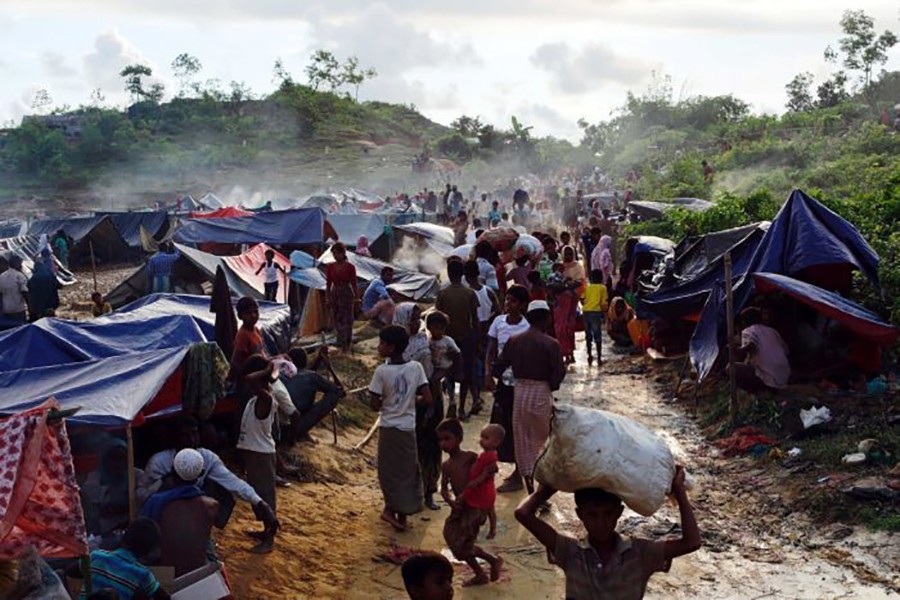When poverty has been constantly declining at a decent rate in the country for about three decades, Ukhia and Teknaf, two upazilas of Cox's Bazar district, are now experiencing an opposite and unsavoury development. The headcount poverty in Ukhia has gone up by 2.73 per cent and in Teknaf 2.63 per cent, according to a research study, jointly carried out by the Policy Research Institute (PRI), a private think tank of Bangladesh and the United Nations Development Programme (UNDP).
These two upazilas are hosting most of nearly 0.6 million Rohingya refugees who fled persecution in their homeland in neighbouring Myanmar.
The study estimated that at least 15,000 inhabitants of the host community have become poor following the massive influx of the Rohingya and another 7,500 have become vulnerable to poverty.
The influx of so many Rohingya refugees has seriously affected the two upazilas, socially, economically and environmentally. They, as hosts of these refugees, have been counting a huge cost.
The researchers admitted that it was difficult to assess the actual cost of the damage caused to the two upazilas in all respects. They, however, roughly figured out the cost of damage to forests at around US$500 million.
The daily wage earners, according to the study, are hit hard by the influx as the local people are hiring the Rohingya refugees at low wages. Local fishermen, numbering about 15,000, are not being able to fish in the Naaf River because of the ban imposed on fishing there. The water and sanitation problems have turned severe because of the refugee influx.
The headcount poverty rate in Ukhia and Teknaf, in fact, would have moved further up had there been no inward flow of assistance, local and foreign, in both cash and kind. The government, international agencies and non-governmental agencies (NGOs) have been spending a huge amount of money on the Rohingya refugees. The inflow of funds has, naturally, buoyed up local economic activities and benefited the population there. The benefits, thus, neutralised, to some extent, the negative effect of the influx of the Rohingya on the life and living of the local population of Ukhia and Teknaf upazilas.
In fact, everything is in a shambles in the upazilas in question. The normal life of the local people is seriously disturbed because of the presence of so many refugees. The authorities have rehabilitated the Rohingya on 4,500 hilly forest land of these two upazilas. The hills are now fully denuded.
The problem is that the local people did not invite the Rohingya refugees to erect camps and live there, temporarily or otherwise. It was a decision of the government, but the local people are the worst sufferers.
The local people are worried that they would have to bear the brunt of the government decision, maybe, for an indefinite period. It is difficult to believe that that Myanmar would ever take back the Rohingya. With a view to withstanding international pressure, Myanmar authorities might hold talks with the Bangladesh authorities and talk about preparations of taking back some of the Rohingya, but they would drag their feet under different pretexts. What they are proposing in the name of repatriation does not mean anything. It is not difficult even for a layman to understand the ploy of Myanmar.
The very attitude of Myanmar does tell enough about its unwillingness to take back the evicted Rohingya population. The experience Bangladesh gained over the issue of repatriation of Rohingyas in the past does not raise any hope of a change in Myanmar's attitude.
So, it is most likely that the local population of Ukhia and Teknaf would have to live with the burden of Rohingya refugees unless the latter are not shifted to some other place within Bangladesh's territorial limit, such as Bhasanchar.
The PRI and the UNDP do deserve appreciation for doing research on the socio-economic impact of rehabilitation of the Rohingya refugees in Ukhia and Teknaf and highlighting the results of the same.
Unfortunately, the government has been busy arranging funds from local as well foreign sources to meet the expenses of food and shelter for hundreds of thousands of refugees. But they have bothered little to know the impact of their decision left on the local population of Ukhia, Teknaf and adjacent areas.
The government that does very often highlight the poverty eradication as one of its key achievements, surely, would not cherish the contrary development taking place in any part of the land.
Without the government intervention, the situation might turn worse. The local people in Ukhia and Teknaf may have to suffer more in the coming days.
The PRI-UNDP study results, in fact, should be seen as a wakeup call for the government. The relevant ministries without any further delay should conduct an in-depth study, assess the problems that the local population is encountering and take up suitable programmes to offset the current trend of impoverishment in areas where the Rohingya refugees have been rehabilitated.


